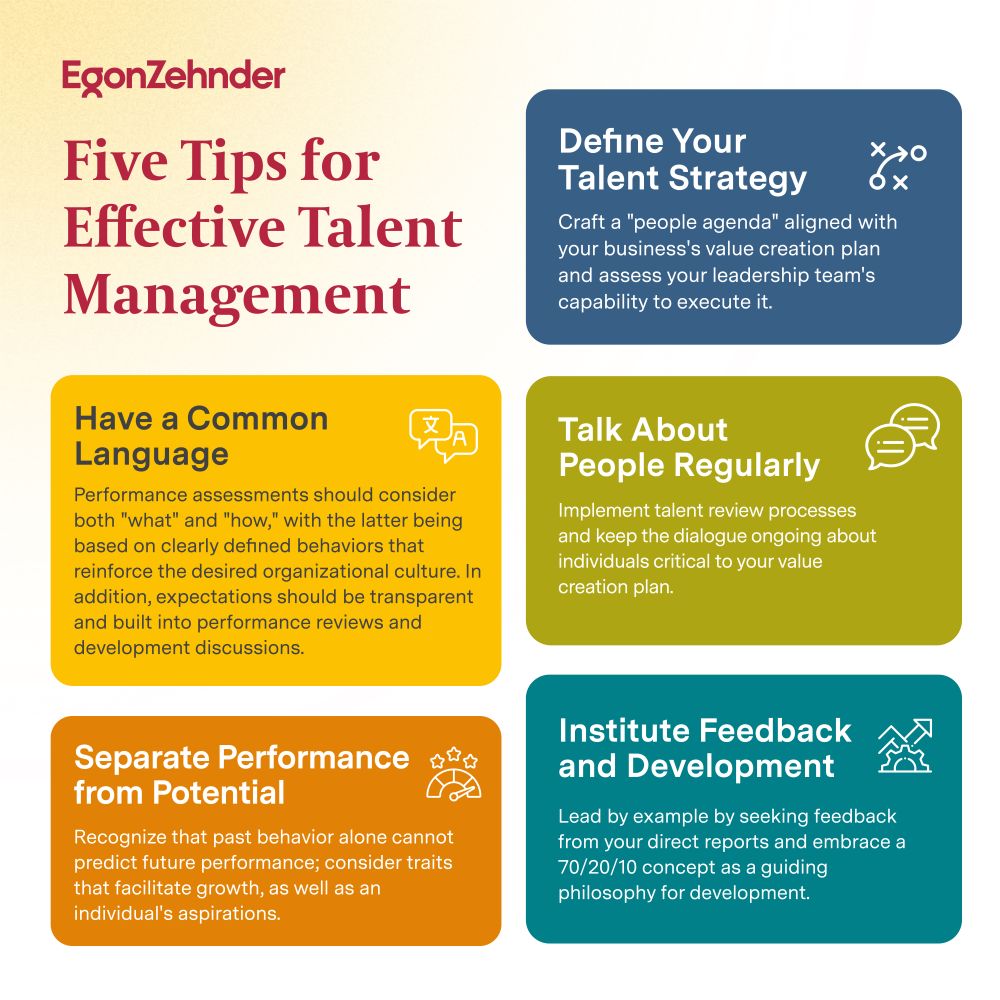While the CEO always plays a pivotal role in shaping the future of their companies, this may be even more true in the world of middle market private equity, in which time and resources are limited. Even though we know how critical people are to realizing the value creation plan, it is easy for talent management to become an afterthought. We delved into this critical area with several CEOs to understand their role in the human capital agenda in partnership with their CHROs, boards and leadership teams.
The Journey of a CEO as Talent Manager: A Shift in Perspective
Transitioning into the CEO seat is a transformative experience, and it often brings about significant personal growth in terms of people development and talent management. Based on Egon Zehnder’s latest CEO survey, whether experienced or not, one of the things newly appointed CEOs find it hardest to do is build senior leadership team capability. According to one CEO, it all starts with self-management, emphasizing the importance of setting an example at the highest levels of leadership, which includes bringing the talent conversation into the boardroom. “Engaging the board on talent is just as important as strategy,” he said.
In addition, being the steward of employee development has become a key part of their role. “We are always talking about talent, and as CEO I am thinking about critical roles, key talent, individuals we want to develop, and key moves we need to make. It’s a chessboard that I constantly need to be overseeing.” another CEO shared.
Crafting the Talent Agenda: An Ongoing Work in Progress
Developing a talent or human capital agenda is where the real journey begins. Many middle-market firms in their growth phase may not have a Chief Human Resources Officer (CHRO), requiring them to build the function and strategy from the ground up. One CEO shared, "We needed someone who owns the culture and business aspects of HR, not just traditional HR functions like payroll and managerial development." This sentiment was echoed by another CEO, emphasizing the need for a CHRO who could represent the employee's voice.
Creating a culture of continuous feedback and setting clear expectations emerged as critical factors for value creation. One CEO noted, "We spend as much time on talent as we do on strategy. How can we change and better support our people? This is a question we ask every day."
Many companies are starting this process from scratch. “We started from ground zero,” a CEO explained. “We went through the 9-box exercise and built a talent agenda that started to look more at potential and behavioral expectations.” The 9-box grid is a good starting point, but the key is actioning the developmental needs that emerge from the exercise. This often means developing manager capabilities to have performance conversations and to deliver meaningful feedback. “It also became just as important to train our employees in how to receive feedback,” one of the CEOs shared.
Current Challenges in Talent Management
One of the pressing challenges in talent management is the demand for high-performing talent. CEOs are strategizing to attract and retain such individuals by reshaping roles to make them more enticing and deploying technology to enhance productivity and efficiency. The focus is shifting toward identifying high-potential leaders who can have a profound impact on the entire organization while also being careful to not stack all of their important roles with only people who are “green,” as this could introduce significant risk in an environment where time is of the essence.
In addition to these tips, CEOs should not underestimate a focus on the effectiveness of their leadership team as a unit. They should encourage discussions not only about what the team is doing but how they are working together to get their work done. Having the team self-rate their meetings and/or asking team members how they can be an even stronger contributor to the team are a couple of techniques that can foster the reflection and conversations needed for the team to improve its dynamics.
As more and more middle market PE firms emphasize human capital as part of diligence, the 90-day and operating plans, and exit, the focus on the CEO’s role in talent management will only continue to increase in importance. By developing a talent agenda linked to the value creation plan, focusing on the roles, individuals, and teams most critical for driving growth, and fostering a culture of feedback and development, CEOs can steer their organizations toward prosperity.






